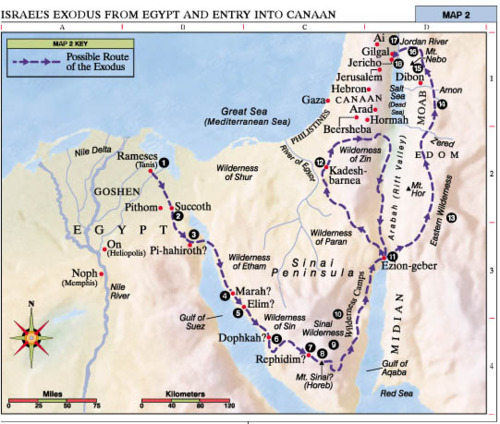The subject is the Israelites, as they are coming out of slavery in Egypt. The tribe of Jacob (the Israelites) went to Egypt during a time of famine, when Joseph had become a high-ranking ruler in Egypt. As generations passed, however, the Israelites multiplied numerously and the kings of Egypt forgot about Joseph, and out of fear of the Israelites' increasing numbers subjected them to slavery and hardship. They were "oppressed with forced labor...they worked them ruthlessly....they made their lives bitter with hard labor..." Doesn't sound like a very desirable situation; in fact, it sounds pretty desperate to me.
And then the Egyptians started killing their baby boys. Just as a mother, to have the joy of a new baby ripped away and replaced with horrifying fear--apart from the normal fears of healthy pregnancy and birth--that if my precious new baby so much as cried (which babies will do), someone might come and kill him mercilessly--that would do me in! I feel like that alone would give me the courage to do whatever it took to gain freedom!
But, Moses came along, and through a series of miracles and wonders, God delivered the Israelites from their oppression. I'm sure it was hard work packing up their homes and doing all the preparation to leave for the long journey (they'd been in Egypt 430 years), but it's worth whatever it takes, right?
They got as far as the Red Sea...not really very far...when they met their first opposition: Pharaoh changed his mind and sent his army after them. They had just witnessed a host of miraculous signs and wonders by the hand of God, and God's very presence had been traveling with them in a manifest form, so you would expect their faith to be strong. But here's how they respond: "Was it because there were no graves in Egypt that you brought us to the desert to die? What have you done to us by bringing us out of Egypt? Didn't we say to you in Egypt, 'Leave us alone; let us serve the Egyptians'? It would have been better for us to serve the Egyptians than to die in the desert!" (Ex. 14:10-12, italics added)
WHAT??!! Shocking, right? It really seemed better to the Israelites to live under oppressive slavery under ruthless slavemasters without even the freedom to give birth...than to face freedom and become rulers of their own land with a loving, powerful God on their side?
In their defense, however, I've also experienced the other side. The Israelites were obviously facing a significant amount of Fear, and Moses answers their complaints with an exhortation: "Do not be afraid. Stand firm." I've recently started reading Max Lucado's book Fearless, and it's been astoundingly eye-opening. I knew I had issues to deal with, but never, ever tied them back to fear; I never thought I was a fearful person, and in fact thought I was an exceptionally non-fearful person. But Max Lucado explains how fear is the root of so many other issues in our lives (I highly recommend this book!):
- Fear corrodes our confidence in God's goodness and makes us question whether He really loves us. It causes us to doubt, and makes our doubt turn to anger.
- Fear turns us into control freaks. We become so insecure that we frantically try to control whatever we can: dieting, cleaning house, people, etc.
- Fear makes us get mean, because we feel threatened and cornered.
- Fear makes us unable to love deeply, because love is risky.
- Fear makes us lose hope and give up. It prevents us from dreaming wildly.
- Fear makes us forget the good things and the miracles God has worked in our lives.
- Fear sucks life out of our souls, steals joy, drains contentment, reverts us to an embryonic stage, creates numbing dread, paralyzes us with insecurity, makes safety our god and causes us to worship a risk-free life ("the easy life," perhaps?)
I think, at least for myself, the slavery and bondage of where I am is familiar, and in that sense it is comfortable. It's not comfortable in and of itself, and of course I would want change! But freedom is unknown, it is expensive, it takes hard work, it is not predictable, and it doesn't allow us to sit around on our rear ends and mope. So I keep thinking about the Israelites, and it brings perspective: Slavery, or Freedom? The choice is obvious...*All it takes* is a face-down with that frightening monster named Fear.
Moses' words to the Israelites encourage me in my own situation: "Do not be afraid. Stand firm and you will see the deliverance the Lord will bring you today. [The Egyptians/ enter personal problem] you see today you will never see again. The Lord will fight for you; you need only to be still" (Ex. 14:13-14). God is not asking me to single-handedly slay the dragon; He's simply asking me to not be afraid and trust Him to be strong. And what a promise! If I can be still enough to let God bring deliverance, I will never see this problem again! Sure, there will be others, but that sounds pretty amazing.
























